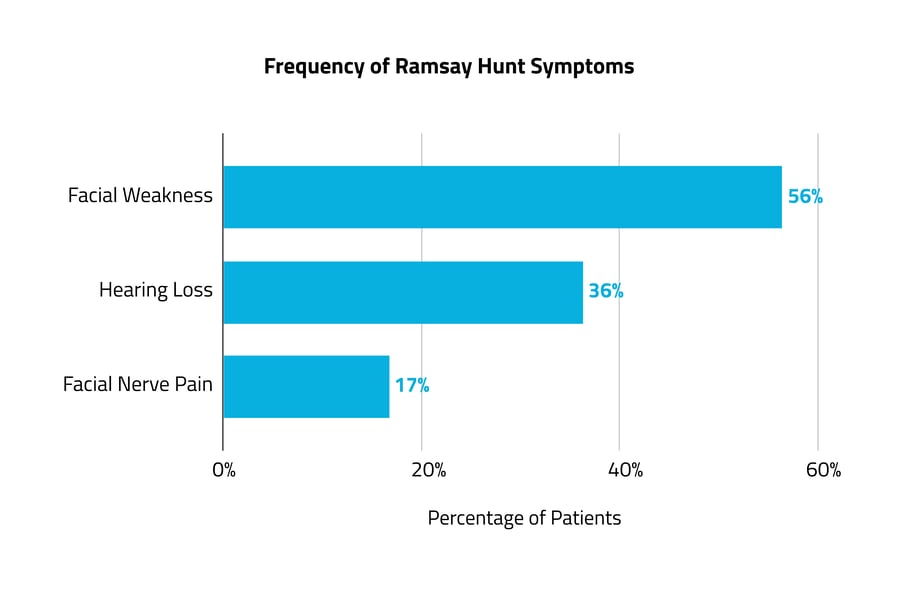The Power of Celebrity in Rare Disorders: Ramsay Hunt Syndrome Makes Headlines

By now, the number of news articles about Ramsay Hunt syndrome may match the number of patients who have been diagnosed with it. Media coverage skyrocketed this summer when Justin Bieber canceled tour dates after being affected by the condition. Ramsay Hunt, or herpes zoster oticus, is a rare neurological disorder impacting about 5-10 in 100,000 people each year. Like shingles, it’s caused by a reactivation of the varicella-zoster (VZ) virus, the same one that initially causes chickenpox.
Ramsay Hunt syndrome affects the facial nerves, causing symptoms like unilateral facial paralysis, pain, rashes, changes in taste perception, tinnitus, vertigo, and even hearing loss. Most patients recover fully, but for others, symptoms can persist for a lifetime. Stress, illness, and immunocompromisation are all thought to trigger reactivation of the virus. Misdiagnosis is common in patients with the condition due to overlapping symptoms and challenging clinical presentations for providers to parse.
To further explore this rare condition, we logged on to Komodo’s Prism tool to look at the patient journey of the nearly 50,000 patients with Ramsay Hunt syndrome in our Healthcare Map™. Here’s what we learned:
Over half of Ramsay Hunt patients present with facial weakness.
Of those patients who presented with symptoms, 56% reported facial weakness within the 30 days before or after their diagnosis, aligning with Justin Bieber’s presentation with facial paralysis. Of other defining symptoms, 36% of patients reported hearing loss and 17% reported facial nerve pain. Certain symptoms may be under-captured due to gaps in clinical coding procedures, meaning they may be higher than what we see here.
About 65% of patients diagnosed with Ramsay Hunt had gone at least 10 years with no herpes zoster flare-ups.
True to form, Ramsay Hunt can seemingly come out of nowhere for patients. In line with our understanding of the disease, we found that most patients see decades-long periods between initial chickenpox infection, or incidents of flare-ups (shingles or Ramsay Hunt).
Misdiagnosis is common for Ramsay Hunt and Bell's Palsy patients.
We found that 21% of patients also had a diagnosis of Bell’s Palsy within the 30 days before or after their Ramsay Hunt diagnosis — two conditions that can present similarly. This speaks to overlapping symptoms and a complex clinical picture for physicians to navigate, making misdiagnosis common. Beyond that, Bell’s Palsy is commonly misdiagnosed with ischemic stroke, so there is a broad set of diagnoses that providers must consider.
Further analyses on Ramsay Hunt could explore changes in diagnosis rates, or in the number of specialties of physicians who’ve ever diagnosed the condition. A PR moment like this gives us an opportunity to track how public awareness and healthcare trajectories collide when it comes to previously little-known disorders. In this case, it’s a celebrity's story that increased the international visibility of Ramsay Hunt and likely gave clues to undiagnosed or misdiagnosed patients. With Komodo’s near real-time data assets, we’re able to follow the impact of cultural events like this, and better understand how awareness impacts the patient journey for those with rare conditions.
For more on cultural events that have shaped rare disease awareness, check out our piece on Marfan's syndrome, How a Popular Musical Shed Light on a Rare Disease — and Saved Lives. You can also read about our work with 50+ rare disease advocacy groups through our partnership with the Chan Zuckerburg Initiative.
To see more articles like this, follow Komodo Health on Twitter, LinkedIn, or YouTube, and visit Insights on our website.





